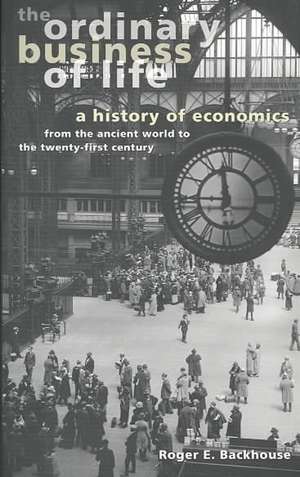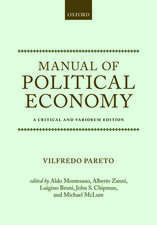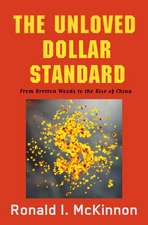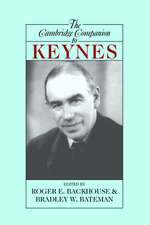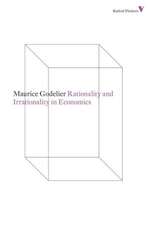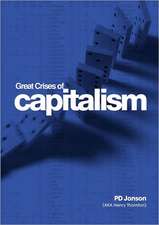The Ordinary Business of Life: A History of Economics from the Ancient World to the Twenty-First Century
Autor Roger E. Backhouseen Limba Engleză Paperback – 29 feb 2004
Preț: 333.88 lei
Nou
63.89€ • 66.70$ • 52.88£
Carte tipărită la comandă
Livrare economică 04-18 aprilie
Specificații
ISBN-10: 0691116296
Pagini: 384
Ilustrații: 1 table, 5 line illus.
Dimensiuni: 128 x 199 x 28 mm
Greutate: 0.48 kg
Editura: Princeton University Press
Locul publicării:Princeton, United States
Cuprins
Prologue 1
The History of Economics 1
What is Economics? 3
Viewing the Past through the Lens of the Present 6
The Story Told Here 8 1. The Ancient World 11
Homer and Hesiod 11
Estate Management--Xenophon's Oikonomikos 13
Plato's Ideal State 18
Aristotle on Justice and Exchange 19
Aristotle and the Acquisition of Wealth 22
Rome 25
Conclusions 27
2. The Middle Ages 29
The Decline of Rome 29
Judaism 31
Early Christianity 33
Islam 35
From Charles Martel to the Black Death 39
The Twelfth-Century Renaissance and Economics in the Universities 41
Nicole Oresme and the Theory of Money 47
Conclusions 49
3. The Emergence of the Modern World View--the Sixteenth Century 51
The Renaissance and the Emergence of Modern Science 51
The Reformation 54
The Rise of the European Nation State 56
Mercantilism 57
Machiavelli 59
The School of Salamanca and American Treasure 60
England under the Tudors 62
Economics in the Sixteenth Century 64
4. Science, Politics and Trade in Seventeenth-Century England 66
Background 66
Science and the Scientists of the Royal Society 67
Political Ferment 73
Economic Problems--Dutch Commercial Power and the Crisis of the 1620s 76
The Balance-of-Trade Doctrine 77
The Rate of Interest and the Case for Free Trade 79
The Recoinage Crisis of the 1690s 84
Economics in Seventeenth-Century England 87
5. Absolutism and Enlightenment in Eighteenth-Century France 89
Problems of the Absolute State 89
Early-Eighteenth-Century Critics of Mercantilism 91
Cantillon on the Nature of Commerce in General 94
The Enlightenment 99
Physiocracy 100
Turgot 104
Economic Thought under the Ancien R�gime 109
6. The Scottish Enlightenment of the Eighteenth Century 110
Background 110
Hutcheson 112
Hume 114
Sir James Steuart 117
Adam Smith 121
Division of Labour and the Market 123
Capital Accumulation 126
Smith and Laissez-Faire 127
Economic Thought at the End of the Eighteenth Century 130
7. Classical Political Economy, 1790-1870 132
From Moral Philosophy to Political Economy 132
Utilitarianism and the Philosophic Radicals 136
Ricardian Economics 137
Alternatives to Ricardian Economics 141
Government Policy and the Role of the State 147
Money 150
John Stuart Mill 153
Karl Marx 156
Conclusions 164
8. The Split between History and Theory in Europe, 1870-1914 166
The Professionalization of Economics 166
Jevons, Walras and Mathematical Economics 167
Economics in Germany and Austria 173
Historical Economics and the Marshallian School in Britain 177
European Economic Theory, 1900-1914 182
9. The Rise of American Economics, 1870-1939 185
US Economics in the Late Nineteenth Century 185
John Bates Clark 187
Mathematical Economics 190
Thorstein Veblen 195
John R. Commons 198
Inter-War Pluralism 201
Inter-War Studies of Competition 202
The Migration of European Academics 207
US Economics in the Mid Twentieth Century 209
10. Money and the Business Cycle, 1898-1939 211
Wicksell's Cumulative Process 211
The Changed Economic Environment 214
Austrian and Swedish Theories of the Business Cycle 217
Britain: From Marshall to Keynes 219
The American Tradition 224
Keynes's General Theory 228
The Keynesian Revolution 232
The Transition from Inter-War to Post-Second World War Macroeconomics 235
11. Econometrics and Mathematical Economics, 1930 to the Present 237
The Mathematization of Economics 237
The Revolution in National-Income Accounting 240
The Econometric Society and the Origins of Modern Econometrics 245
Frisch, Tinbergen and the Cowles Commission 248
The Second World War 252
General-Equilibrium Theory 254
Game Theory 262
The Mathematization of Economics (Again) 265
12. Welfare Economics and Socialism, 1870 to the Present 269
Socialism and Marginalism 269
The State and Social Welfare 271
The Lausanne School 274
The Socialist-Calculation Debate 275
Welfare Economics, 1930-1960 279
Market Failure and Government Failure 282
Conclusions 284
13. Economists and Policy, 1939 to the Present 288
The Expanding Role of the Economics Profession 288
Keynesian Economics and Macroeconomic Planning 290
Inflation and Monetarism 295
The New Classical Macroeconomics 298
Development Economics 301
Conclusions 306
14. Expanding the Discipline, 1960 to the Present 309
Applied Economics 309
Economic Imperialism 311
Heterodox Economics 313
New Concepts and New Techniques 317
Economics in the Twentieth Century 321
Epilogue: Economists and Their History 325
A Note on the Literature 329
References 344
lndex 353
Textul de pe ultima copertă
"Roger Backhouse's new history of economics is just what is needed: a short but still comprehensive history of economic thought which can be read with profit not only by economists but also by a variety of noneconomists, such as historians, philosophers, sociologists, and so on. Complex ideas are summarized with exemplary clarity, and the book practically reads itself. The Ordinary Business of Life is a find."--Richard Swedberg, Stockholm University, author of Max Weber and the Idea of Economic Sociology
"In recent years many new sub-fields of economics have undermined the grand 'neoclassical synthesis' of the mid-twentieth century. Readers of this concise yet sweeping survey will see clearly that today's major dissenting schools, like neoclassical economics itself, have deep roots in the discipline's rich classical heritage. Roger Backhouse has written an elegant and thoroughly enjoyable book that will enable a broad audience to appreciate both the continuities of economic thought and its unavoidable inner tensions."--Timur Kuran, Professor of Economics and Law and King Faisal Professor of Islamic Thought and Culture, University of Southern California
"Roger Backhouse provides what is perhaps the most readable history of the dismal science, describing the role of economic ideas in shaping the way we live and think from the ancient world to the present. Although it is obviously difficult to describe how economic models and theories evolved over several millennia, Mr. Backhouse has succeeded admirably. Few books can claim to provide such an accessible and complete cataloging of the role that economic ideas have played in the 'ordinary business of life.' "--George Borjas, Harvard University, and author of Heaven's Door: Immigration Policy and the American Economy
"Backhouse is perhaps the best person in the world to write this historian's history of economic thought. His is the history of the visions, not the technical tools, of the great economic traditions and schools. His deep knowledge of economic theory shows on every page."--Herbert Gintis, University of Massachusetts, author of Game Theory Evolving
Recenzii
[Backhouse's] very readable history offers economists and interested readers an excellent account of the evolution of economic ideas.
Useful to those who already have a smattering of economic ideas but want to fill in the historical gaps . . . [this will] also be an eye-opener to specialist economists.
This compact study gives an accomplished and remarkably comprehensive overview of an often arcane field of inquiry.
Backhouse explains how world economics reached its present state. He places key figures in an appropriate historical context and then explains the various economic ideas as they emerged, using clear analysis and apt quotations. The result is a well-integrated, thoughtful, accessible text that makes a major contribution to the history and philosophy of economics. Important reading for students, professionals, and anyone interested in learning how economics has evolved.
A scholarly book that will have appeal to well-read library patrons within the general population.
Thinking like a historian, [Backhouse] has tried . . . to explain how economics got to where it is, especially in its interconnections with other disciplines. He has largely succeeded.
A readable and enjoyable volume accessible to a broad audience, and of considerable value and interest to professional economists.
Roger Backhouse has written a history of economics that is sweeping in is historical scope, while also being extremely concise. . . . [A] commendable introduction to the historical context of modern economics.
Roger Backhouse's brief survey of the history of economic thought is well written and accessible to non-specialists. . . . [T]his is a fine book for a busy professional economist who wishes to delve into a short history of economic thought.
"An important work... [Backhouse's] treatment gives deeper insight into historical economic writings and suggests broader views of contemporary economic issues than many well-read economists are likely to have. Interesting and accessible to amateurs, it should also be welcomed by professionals."--Publishers Weekly "[Backhouse's] very readable history offers economists and interested readers an excellent account of the evolution of economic ideas."--Science "Useful to those who already have a smattering of economic ideas but want to fill in the historical gaps ... [this will] also be an eye-opener to specialist economists."--Samuel Brittan, Journal of Economic Literature "This compact study gives an accomplished and remarkably comprehensive overview of an often arcane field of inquiry."--Kirkus Reviews "Backhouse explains how world economics reached its present state. He places key figures in an appropriate historical context and then explains the various economic ideas as they emerged, using clear analysis and apt quotations. The result is a well-integrated, thoughtful, accessible text that makes a major contribution to the history and philosophy of economics. Important reading for students, professionals, and anyone interested in learning how economics has evolved."--Library Journal "A scholarly book that will have appeal to well-read library patrons within the general population."--Mary Whaley, Booklist "Thinking like a historian, [Backhouse] has tried ... to explain how economics got to where it is, especially in its interconnections with other disciplines. He has largely succeeded."--The Economist "A readable and enjoyable volume accessible to a broad audience, and of considerable value and interest to professional economists."--Choice "Roger Backhouse has written a history of economics that is sweeping in is historical scope, while also being extremely concise... [A] commendable introduction to the historical context of modern economics."--Stephen Kirchner, Policy "Roger Backhouse's brief survey of the history of economic thought is well written and accessible to non-specialists... [T]his is a fine book for a busy professional economist who wishes to delve into a short history of economic thought."--Robert E. Prasch, Journal of Economic Behavior and Organization
